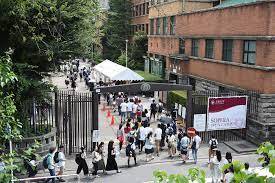
People often take it for granted that the best way to learn a foreign language is to travel or live in a country where the target language is spoken. They believe that being present in a foreign country will dramatically grow their language skills, like water, sunlight, and Miracle Gro to a plant. However, language learning isn’t formulaic. You can’t just plug an individual into a foreign country and expect language mastery to be the result. The environment of a foreign country or city can potentially facilitate language learning, but what’s far more important is the individualized experience of the traveler. When traveling, three main factors influence how much language improvement is likely to take place: 1) the destination country; 2) the traveler’s occupation; and 3) the traveler’s lifestyle.
The Destination Country Influences Language Learning
As a native English speaker, my language is spoken in many countries around the world. When I was in Jordan and Lebanon, there were signs in English posted everywhere, and most natives had some grasp of the language. A lot of foreigners viewed interactions with me as an opportunity to practice or show off their English. Similarly, if they sensed that their English was better than my Arabic, they typically preferred to speak in my native language so that we could have a better conversation. In other words, the practical advantage of speaking English among certain bilingual types can be a complication in the process.
Students of English as a foreign language, in contrast, do well in most American cities. This owes to the fact that relatively few Americans are bilingual, and many bilingual Americans are eager to speak English, since English is pervasive in American culture. As a result, many foreigners make great progress in English when they come to the US because relatively so few people are capable of, or interested in, speaking a language other than English.
The Traveler’s Occupation Influences Language Learning
The second factor—occupation—is critical because it dictates how travelers will spend the majority of their time.. Travelers on a foreign exchange or language study program may receive daily exposure to the language in the form of classes and cultural activities programmed into the agenda. For example, when I was studying Arabic at Oman’s Nizwa University during the summer of 2014, we had around four hours of Arabic class every day and numerous cultural activities with native speakers who were required to communicate with us in Arabic. As participants, we also had to sign a language pledge only to speak Arabic amongst ourselves for two months (even though we all reneged). Middlebury College in Vermont, USA, is famous for similar immersion programs that are highly effective at promoting language development.
On the other hand, I know people who live in a foreign country and work a job in their native language. This is actually quite common now with remote work having surged in popularity. A number of people prefer to live in a non-English speaking country for cultural reasons, while earning a salary from an American company or company that otherwise doesn business in English. Given how time-consuming work is, it is typical for people with English jobs to make very little progress in the foreign language, no matter how long their stay is in the host country.
Lifestyle Influences Language Learning
The third factor—lifestyle—is arguably the most important of all. In the Middle East, for example, are you out on the streets or in people’s homes interacting with locals, or do you spend the majority of your free time in the house? According to a February, 2021, survey of Americans, nearly half of respondents reported spending 5-6 hours a day on their phone, and another 11% reported spending 7 hours or more, not including work-related activities. Figures like these are on par with what you might expect in the smartphone era and may even be slightly higher in reality, given that the data was self-reported.
There’s a saying in English, you can take a horse to the water, but you can’t make it drink. When it comes to language learning, what we do is far more important than where we are located, especially now with the abundance of quality electronic dictionaries, references, smartphones, and language exchange applications. Travel experience can easily amount to a wasted opportunity, in terms of language development, if we aren’t intentional about applying ourselves. Allow me illustrate…
My Japanese Got Worse In Japan
In the spring of 2015, I spent four months in Tokyo on a study abroad program through Sophia University. What’s ironic is that my Japanese actually regressed during that span. When you break it down, my experience fell short on all three of the factors—country, occupation, and lifestyle—that influence language learning abroad. For one, many people at Sophia University spoke good English. This isn’t true everywhere in Japan, but location within a country matters, too. I had friends who barely spoke any Japanese at all, and they fared just fine. Second, Sophia University was international. English was the language of instruction of all of my classes. You had to specially apply to take classes taught in Japanese, which very few foreigners due to the high probability they would fail. Third, my lifestyle wasn’t conducive to language learning. Like my peers, I chose to socialize primarily with other internationals who shared my dormitory. Communication in Japanese was arduous, and there was no course curriculum or social pressure prompting anyone to do so. More often than not, I and my peers chose the more comfortable route of speaking English amongst ourselves.

Overall, I had a good time in Tokyo, and I hope to be able to go back one day. I miss the people, the food, the cherry blossoms, the bullet train, the natural landscapes, and the cutting-edge technology. Japan was full of imagination, and it’s unlike any country I’ve ever visited. However, upon returning back home, I decided to abandon Japanese in favor of Spanish and Arabic. I determined that the effort required to get really good at Japanese paled in comparison to the scarce cultural and economic opportunities I was likely to receive in my future. My connection to Latin America and the Middle East was a lot stronger, and I already had my hands full with these languages and my other academic pursuits.
The Myth Of Immersion?
The myth of immersion isn’t that immersion doesn’t work. Immersion does work. The myth of immersion is that traveling to a foreign country is a necessary step. People can experience the benefits of immersion wherever they are.They can consume media, change the language of their phones, find language partners using apps like HelloTalk, or practice translation throughout the day. And an immersive environment is most useful when we actively engage with our environment. In other words, not just about what we see and hear, it’s about what we are able to understand.
